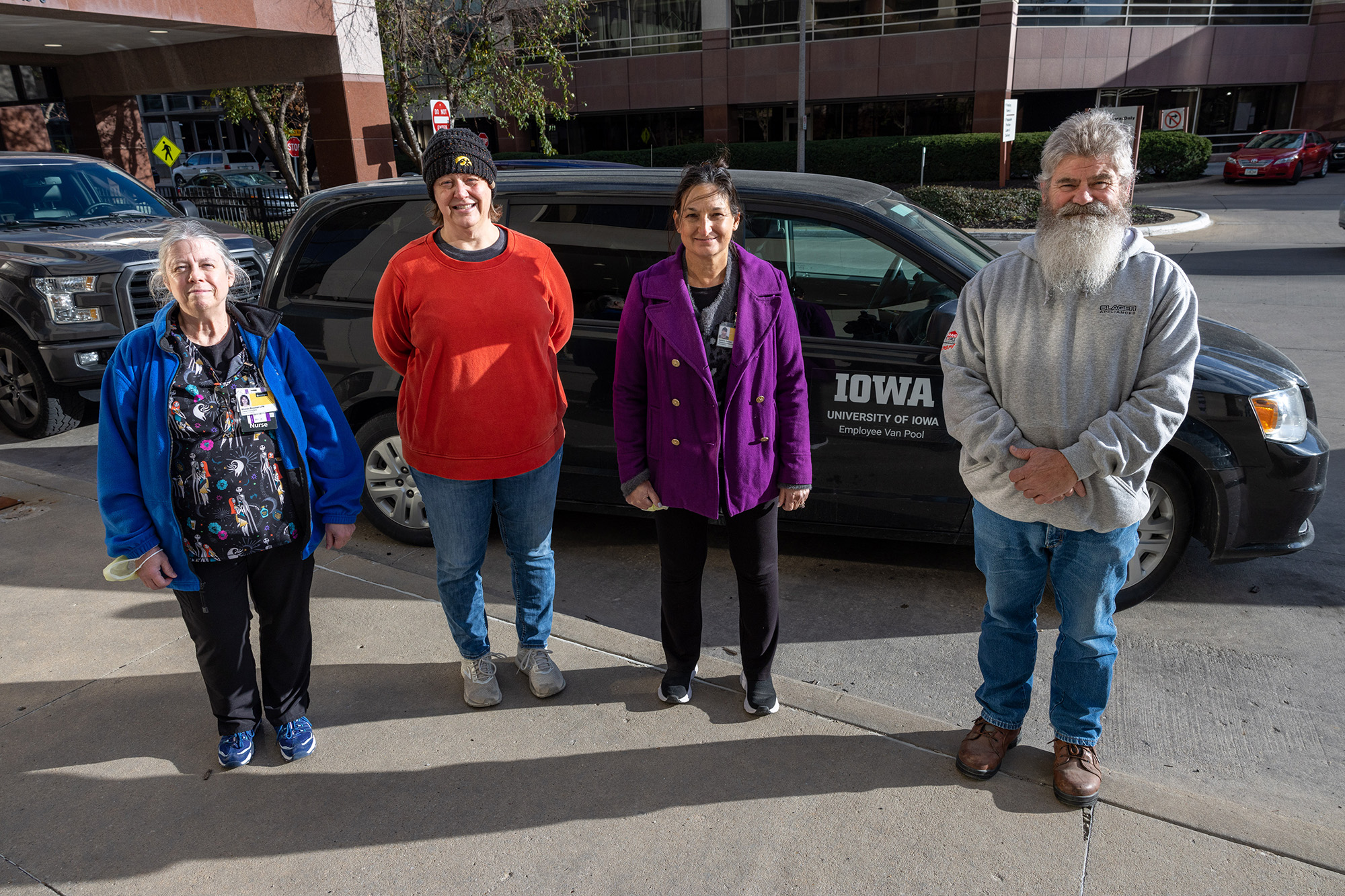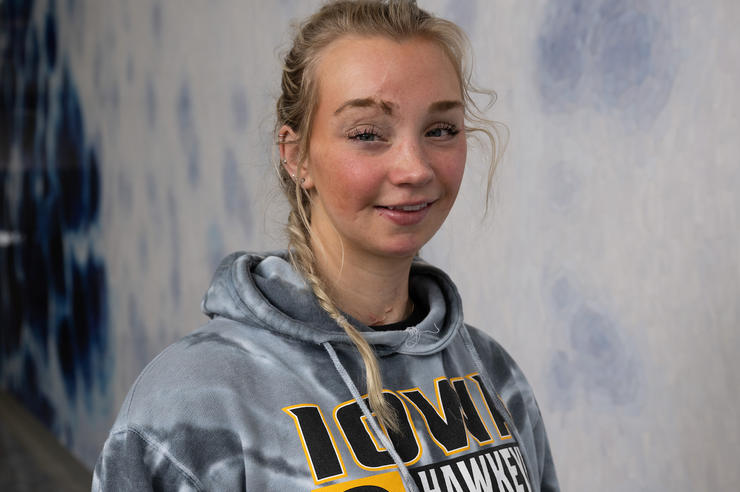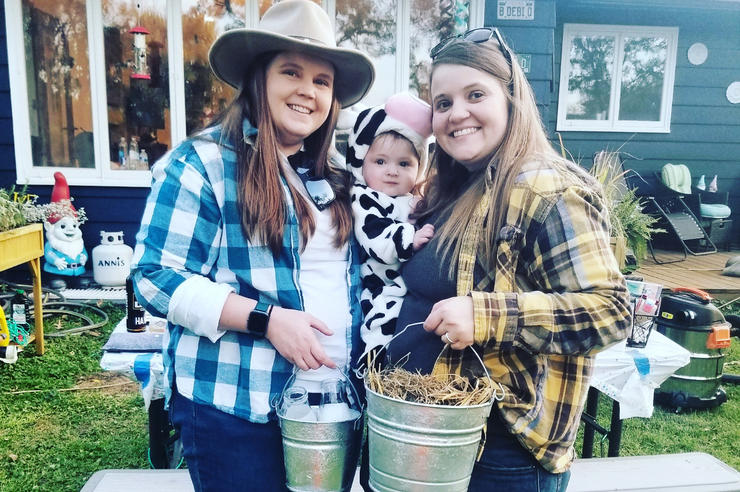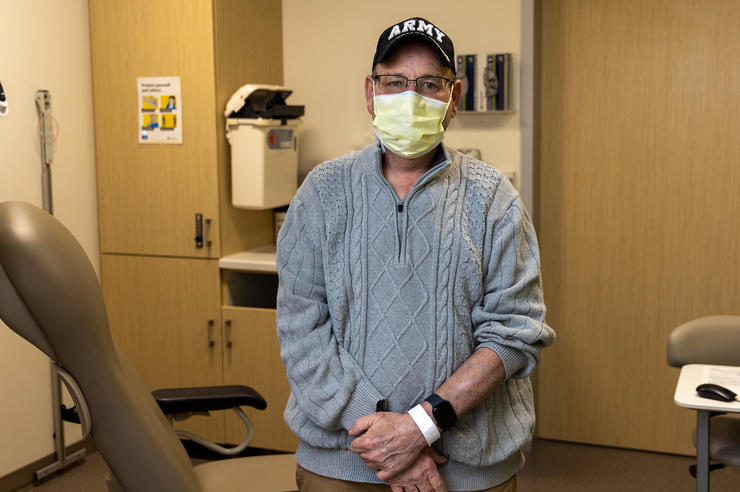Van pool riders take the wheel in roadway rescue

The moments before a crisis can often feel serene and mundane. Interstate traffic was moving steadily. The weather was decent. And the four members of the University of Iowa Health Care Riverside #1 van expected a conventional commute.
What happened next was anything but. It was a moment that left them beaming with pride and gratitude. The skills they’ve honed while working with UI Health Care, both in and out of clinical spaces, allowed them to rise to the challenge of helping a stranger deal with a medical emergency.
Weeks later, the van pool consisting of Scott Riggan, facilities management; Rhonda Rossman, LPN, a pediatric hematology/oncology nurse; Joyce Lord, an anesthesia technician; and Deb Hunter, an administrative services coordinator, gathered outside University of Iowa Hospitals & Clinics to reflect on what happened on that Friday morning.
The group remembers that Riggan was driving. Rossman had her nose in a book. Hunter and Lord were just planning for what the workday could bring.
“We were making good time on the drive. But then I noticed the driver of this other car pushing on someone in the passenger seat. They had a phone in one hand while also trying to steer,” Riggan says.
Riggan quickly got the attention of the others in the van, asking if they should see if the driver needed help.
“I remember the driver looking so scared,” Rossman says. “That’s when we really started trying to get their attention and then we saw the passenger in the other car was unconscious.”
While Riggan focused on driving, the women in the van pool encouraged the panicked driver to pull over, signaling through the window that they would help him.
“As soon as everyone pulled over, our nurse here jumped into action,” Lord says of Rossman. “Deb and I just took her marching orders. She told us to call 911 and to grab her a timer, so we did that.”
“You guys were great backup!” Rossman says.
Hunter and Lord praise the quick actions of Rossman, saying it was impressive to see her assess the passenger’s issue. Rossman says the situation reminded her why the fundamentals of emergency care are vital.
“When something like that happens, you just go back to your basics: check their airway, breathing, and circulation,” Rossman says.
To the pediatric oncology nurse, her response was basic, but to the others, her ability to respond with a level head was top-notch.
“Rhonda was so calm during all of this,” Hunter says. “She treated the passenger like she would her own child.”
As Rossman monitored the passenger, first responders surrounded the two vehicles.
“There were red lights everywhere; I’ve never seen so many come up at once,” Riggan says.
“The EMTs immediately turned to me. I told them the woman’s vitals and what I observed,” Rossman says. “I heard the driver say it seemed like she had a seizure while they were driving to a hospital.”
With the passenger and driver now in the hands of the first responders, the employees returned to their van and resumed their commute.
“We all just sort of looked at each other, sort of wondering what else was going to happen that day,” Lord says. “We actually all made it to work on time!”
Riders encourage emergency preparedness
Since the incident, the van pool riders had some time to reflect on that morning. For Hunter, looking back on that morning makes her grateful she learned some of the basics of how to help in an emergency.
“Even though we didn’t need it, I was really grateful that the hospital offered a bunch of us the chance to get certified in CPR,” Hunter says.
While they’ve all had time to process what happened that morning, one question remains in the front of their minds.
“We just wish her the best,” Rossman says. “Because we may never know what happened next.”


